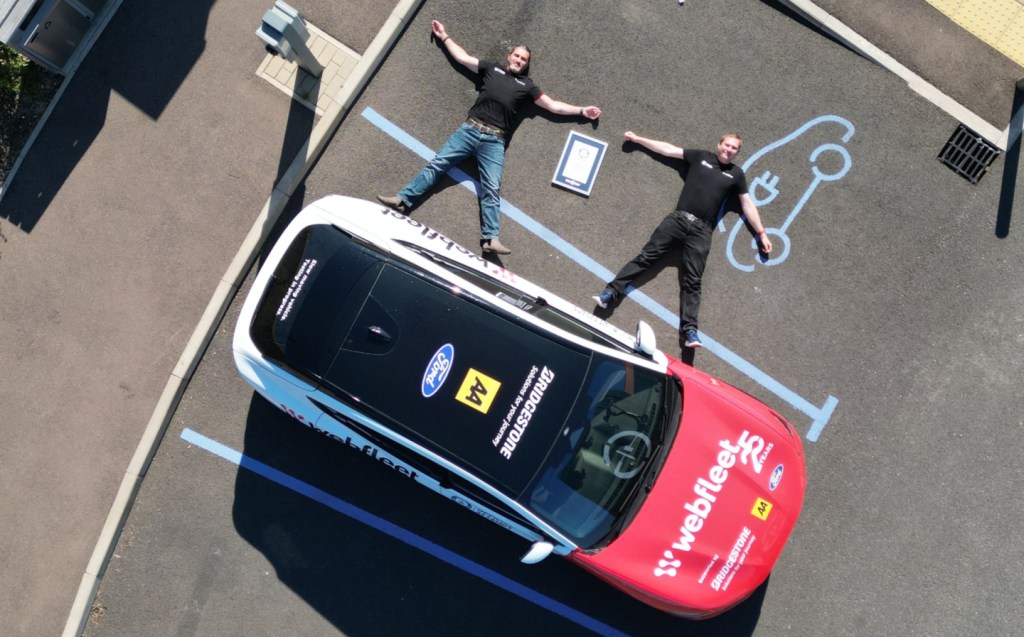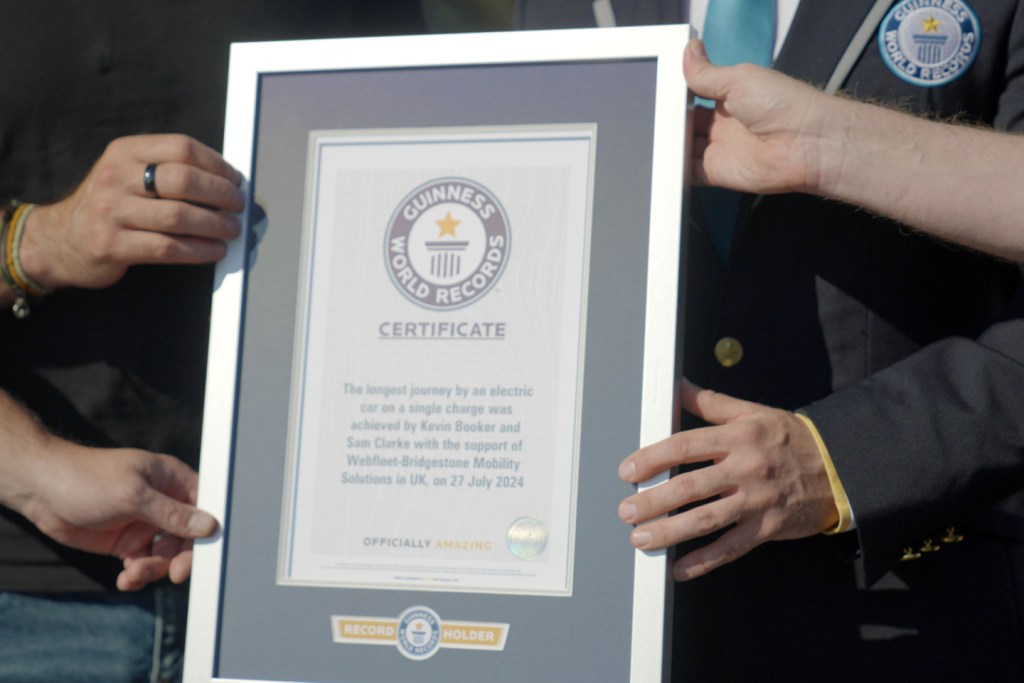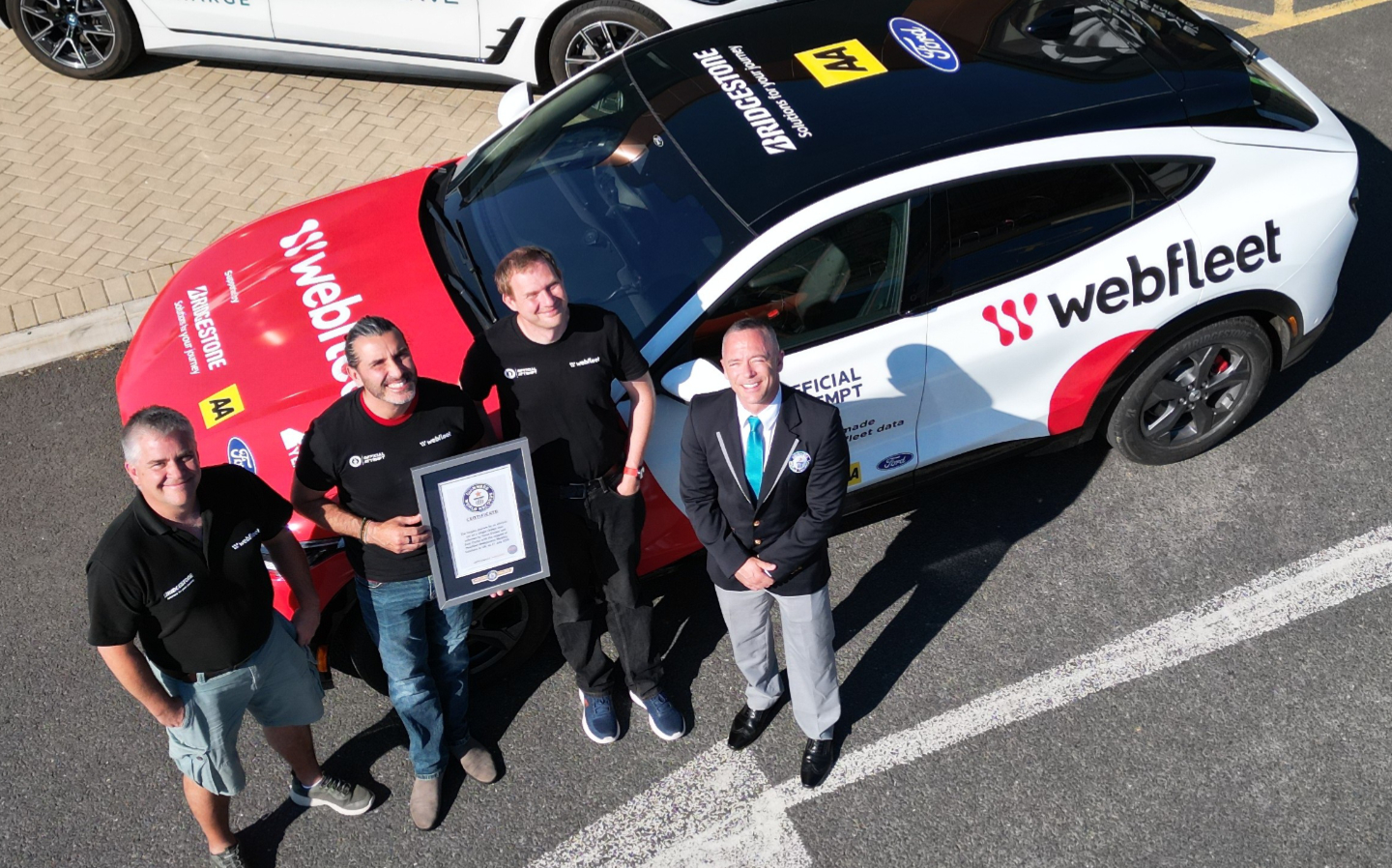Electric car sets new world record by travelling 570 miles on single charge
Hypermiling an electric pony
A Ford Mustang Mach-E has set a new Guinness World Record for the longest journey by an electric vehicle (EV) without stopping to charge.
Although Ford only claims a range of 373 miles from the Mach-E’s 91kWh battery, a British team drove the car 569.64 miles through the east of England on a single charge.
The feat — supported by the AA, Bridgestone and the tyre manufacturer’s in-house telematics company Webfleet — usurps the previous record of 563.97 miles, set in Hangzhou, China.
That record was set using a Chinese-built Zeekr in September 2023, and added to that carmaker’s selection of EV world records. The Zeekr 001 estate car holds the record for the fastest drift by an electric car, for example, as well as another record for the fastest slalom by an EV.
But while Zeekr’s record took place in China, the Mach-E’s drive was on public roads through Norfolk, Lincolnshire, Yorkshire, Nottinghamshire, Leicestershire and Cambridgeshire in a single 24-hour period. Overall, the team achieved economy of 6.25 miles per kilowatt-hour, far exceeding Ford’s published figures.
According to the industry-standard Worldwide Harmonised Light Vehicle Test Procedure (WLTP) economy test, through which production cars in Europe are homologated, the Mustang Mach-E Premium Extended Range RWD used in the record attempt is capable of around four miles per kilowatt-hour.

Nevertheless, the British driver team of Kevin Booker and Sam Clarke achieved an improvement of more than 50 per cent in efficiency, verified by a combination of independently-monitored video footage, odometer readings and GPS tracking, as well as battery level data.
Booker and Clarke are seen as some of the UK’s best hypermilers, and have both previously held records for fuel economy and energy consumption in electric vehicles. The pair said they hoped the achievement would open drivers’ eyes to the possibility of switching to EVs.
“Breaking this record has been an exhilarating journey and a powerful demonstration of what electric vehicles can achieve,” said Booker, who now has two Guinness World Records for driving-related achievements.
“It is incredible to see how far we have come with EV technology and efficiency. We hope this inspires more people to consider electric vehicles for their everyday travel.”
Meanwhile Clarke, who has taken his Guinness World Records tally to five, said the journey was an “extraordinary experience.”

Edmund King, the president of the AA, said the achievement was “important” and would help drivers concerned about range to convert to electric vehicles.
“We are delighted to have supported this incredible achievement with our expert patrols and backup team,” he said. “The drivers, together with Ford Mustang Mach-E, Bridgestone and Webfleet, have all used their expertise to prove that EVs can go much further than people think. Such endeavours are important to show that electric vehicles can be a major part of the future transport mix.”
Beverley Wise, the Webfleet UKI regional director for Bridgestone Mobility Solutions, added: “This record is a testament to the hard work and dedication of everyone involved in this endeavour.
“It represents a significant milestone in the electrification of road transport and demonstrates the potential of electric vehicles when supported by innovative Bridgestone tyre design and advanced fleet management technology.”
Record-breaker Kevin Booker’s five tips for maximising electric car range

1. Read the road ahead
“EVs offer instant power delivery. This is great for quick manoeuvres and overtakes, but it’s important to remember that aggressive acceleration negatively affects how far an EV can go per charge. Train yourself to gently press the accelerator, gradually increasing momentum to reach your desired speed, by reading the road ahead carefully. Anticipating traffic light changes, turns, gaps at roundabouts and so on can improve efficiency drastically. Getting lazy, accelerating and braking hard, will decrease your range.”
2. Take advantage of regenerative braking
“Regenerative braking is when you lift off the accelerator and the car begins to decelerate quickly. It can feel even stronger than engine braking in a petrol or diesel car, and means you don’t need to press the brake pedal, so the kinetic energy normally wasted as heat is converted to electricity and goes back into the battery, increasing the car’s range. The added benefit is that it increases the life of your brake pads, reducing maintenance costs of Evs even further.”
3. Select the right tyres
“Tyres are the only part of a car connected to the road, and selecting a premium-rated tyre for fuel efficiency will have a direct impact on your battery range. I recommend choosing an A-rated tyre for rolling resistance, such as the Bridgestone Turanza 6 (or the Turanza Eco), as they will help maintain a long range per charge without sacrificing tread life.”
4. Check your tyre pressures
“Without the correct tyre pressure you will increase their rolling resistance and decrease their performance. So if you have chosen an A-rated tyre for rolling resistance, by incorrectly inflating them you will not be maximising their potential. Even a slight reduction in pressure can significantly impact the car’s range so I strongly recommend checking your tyre pressures at least once a month, as well as before and after long-distance journeys.”
5. Plan for your electric vehicle load
“Thinking about added vehicle weight is crucial to an EV’s range. Additional loads can impact how far you can travel so it’s advisable to travel with minimal weight, avoiding unnecessary cargo whenever possible. Certain payloads are unavoidable, though, such as in delivery vans or carrying luggage for a family holiday, so consider the effect on the vehicle’s range and adjust the journey plan accordingly. An additional stop at a charging station en route, or waiting to charge the battery a little more than the EV thinks is required for the journey, could help you operate your electric vehicle more efficiently and save time in the long run.”
This article features a link that may earn affiliate revenue for Driving.co.uk, however we never allow that to influence our unbiased editorial.
Related articles
- If you found news on the proposed Stonehenge tunnel interesting, you might like to read more about previous attempts to prevent its construction
- Read more on why the A303 tunnel risked putting Stonehenge’s Unesco status on the line
- You might also like to read about other issues with the previous government’s road-building plan
Latest articles
- Should I buy a diesel car in 2025?
- F1 2025 calendar and race reports: The new Formula One season as it happens
- Zeekr 7X AWD 2025 review: A fast, spacious and high tech premium SUV — but someone call the chassis chief
- Denza Z9GT 2025 review: Flawed but sleek 1,062bhp shooting brake from BYD’s luxury arm
- Extended test: 2024 Renault Scenic E-Tech review
- Best-selling cars 2025: The UK’s ten most popular models of the year so far
- Audi A6 Avant 2025 review: Trusty executive estate ticks expected boxes, and there’s still a diesel option
- Keir Starmer eases pressure on carmakers to sell EVs in response to ‘global economic headwinds’
- Ferrari 12Cilindri Spider review: Heady blend of traditional and futuristic becomes even more intoxicating after lid is removed














